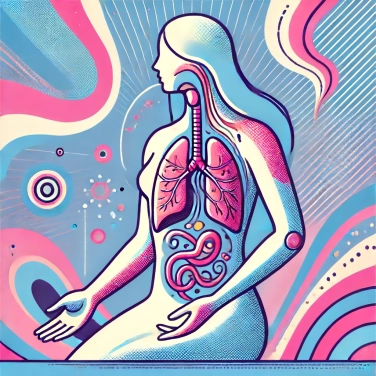The diaphragm can sometimes become blocked due to muscle spasms, stress, anxiety, fatigue, or respiratory disorders or other health problems.

The diaphragm is that large dome-shaped muscle located beneath the lungs. It separates your thorax (where your lungs and heart are) from your abdomen, where your stomach, liver, and all that are. When it contracts, the diaphragm moves downward, increasing the volume in the thoracic cavity and allowing air to enter: and voilà, you inhale. When it relaxes, it rises, pushing air out, and you exhale. Simple and effective. This automatic movement is managed by your nervous system without you even thinking about it consciously. Occasionally, there may be hiccups—like that famous hiccup, for example—but normally, it works smoothly on its own.
The diaphragm can sometimes become locked due to some fairly common mechanisms such as involuntary contraction or muscle spasms. The most classic example is hiccups, a rapid series of involuntary and bothersome contractions. Stress or a strong emotion can also trigger these temporary blockages by disrupting your normal breathing rhythm. Digestive issues such as stomach irritation or excessive consumption of carbonated drinks can irritate the phrenic nerve, which controls your diaphragm. Finally, overly intense physical activity or poorly performed exercises can sometimes create small cramps in the diaphragm, leading to that infamous unpleasant blockage.
Some factors increase the chances of your diaphragm getting locked. First, intense physical effort without proper preparation easily exposes you to this kind of trouble. Next, shallow or rapid breathing due to stress or anxiety can play tricks on your diaphragm. If you overindulge in carbonated drinks before your workout sessions, be careful of hiccups or a locked diaphragm. Repeated poor posture, like constantly hunching over your computer, can promote muscle tension, including in the diaphragm area. Finally, certain digestive disorders like gastroesophageal reflux or difficult digestion can also contribute to the phenomenon.
When your diaphragm gets stuck, you may feel a rather frightening sensation of suffocation or an uncomfortable difficulty in taking deep breaths. This respiratory discomfort often creates stress that exacerbates the situation, forming a sort of vicious circle. Moreover, during a persistent hiccup (which is actually an involuntary contraction of your diaphragm), it can even cause muscle pain in the chest or abdomen. And of course, if your diaphragm doesn't release quickly, your body will struggle to properly oxygenate your cells, leading to fatigue, or even dizziness or small ailments in extreme cases. In short, having a stuck diaphragm is bothersome and uncomfortable, and it eventually affects your daily life if it lasts too long.
To prevent your diaphragm from getting stuck or to quickly calm spasms, the simplest method is to breathe slowly and deeply, while controlling your breath. Sometimes, just holding your breath for a few seconds, then exhaling slowly can quickly resolve the issue. If that’s not enough, some tips like drinking a glass of water in small sips, or gently sticking out your tongue can help relax this muscle. Also, try to avoid common triggers: limit carbonated drinks, eat slowly without swallowing too much air, and avoid stressful or overly exciting situations while eating. In some persistent cases, your doctor may suggest specific exercises like breathing rehabilitation sessions, or, rarely, medication if necessary.
Hiccups are actually involuntary and repetitive contractions of the diaphragm. Factors such as stress, rapid ingestion of food, or carbonated drinks can trigger them.
Stretching your arms up and breathing slowly and deeply helps to relax the diaphragm when you feel a sense of blockage or discomfort in your breathing.
Did you know that strong emotions, such as anxiety or fear, can contribute to a 'blocked' or tense diaphragm, thereby causing an uncomfortable sensation when breathing?
Among athletes, particularly long-distance runners, a side stitch is often caused by excessive tension in the diaphragm, especially when there is a rapid change in pace or when starting exercise without adequate warming up.
A diaphragm blockage can manifest as a feeling of chest tightness, difficulty breathing deeply, or shallow and rapid breathing. If these symptoms persist, consulting a healthcare professional is advisable.
Deep diaphragmatic breathing, respiratory yoga exercises such as pranayama, and gentle trunk stretches can greatly help relax a contracted or tense diaphragm.
Sure! Here’s the translation: "Yes, a heavy diet, excessive consumption of gaseous foods, or difficult digestion can cause the stomach to put additional pressure on the diaphragm, thereby contributing to its blockage or respiratory discomfort."
In some cases, yes. Poor breathing during intense physical activities like running can lead to spasms or a temporary blockage of the diaphragm, a phenomenon often referred to as a "side stitch."
Yes, stress and anxiety can cause involuntary muscle tension, including in the diaphragm, which can lead to temporary blockage and difficulty breathing deeply.

No one has answered this quiz yet, be the first!' :-)
Question 1/4